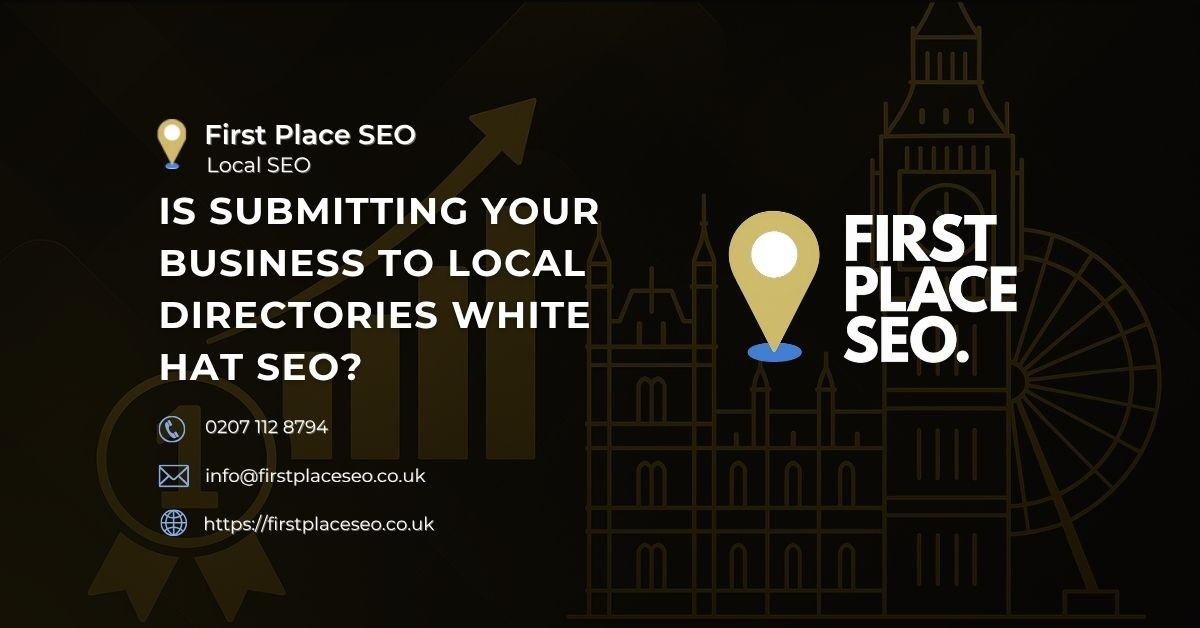Is submitting your business to local directories a white hat SEO strategy?
Yes, it is. Submitting your business to reputable and locally relevant directories is a recognised white hat SEO technique. It improves local search visibility, strengthens your digital presence and builds trust with both search engines and potential customers. By using consistent business information and choosing high quality platforms, you can increase your visibility in local organic search results and maps listings.
Here's What We Have Covered In This Article
Local Directory Listings: Why They Matter for Ethical SEO
Why does local SEO matter for businesses in the UK?
For businesses that serve specific areas or local communities, visibility in search results is key. When people in the UK search for services nearby, local directories often appear on the first page of results. Listings on platforms such as Google Maps, Yell, Yelp UK and Bing Places influence who shows up first. Being present and correct on these platforms helps you meet people when they are ready to act.
How do local citations build consistency and trust?
Search engines rely on accurate information to match your business with relevant searches. Local citations that include your business name, address and phone number signal to Google and Bing that the information is reliable. This trust improves your chances of appearing in local search features like the map pack or location based results. Well managed citations also help reduce duplicate listings and inaccurate details that can harm trust.
Which directories should you choose for SEO impact?
Directories should meet three main criteria. They must be trusted by users, updated regularly and relevant to your sector or location. Yell.com, FreeIndex, and Thomson Local are good choices for businesses in the UK. Avoid low quality sites that accept any listing without moderation. Focus on platforms that appear in search results for your business type and location.
How do directory listings support broader SEO?
When your site mentions your services and location, and your directory listings do the same, it strengthens those signals. For example, a listing that says “accountant in Norwich” helps confirm what your website already says. These consistent references build relevance around target keywords and reinforce your service area. This is especially useful for improving local intent search queries.
Pro Tip : Prioritise directories that already rank well in your business category and region. These give you greater exposure with minimal effort.
Improve Your Google Business Profile
Struggling to manage listings across multiple locations? Let our team keep your business information accurate and up to date everywhere it matters.
Best Practices for Submitting to Local Directories
How can you keep business information consistent across platforms?
Use the same business name, address and phone number in every listing. Check for variations in abbreviations, spelling and punctuation. Even small differences can make a big impact. Use a master document or local SEO tool to track changes and monitor accuracy. Matching your information across Google Business Profile, Facebook and third party directories improves your local ranking strength.
What makes a strong business description in a directory?
Your description should be clear and concise. Use terms people actually search for, like “garage repairs in Leeds” or “childminder in Cardiff”. Avoid filler text or marketing buzzwords. Focus on what you do, where you do it and who you serve. Keep your language natural, and include service and location based keywords that match your site’s metadata and content.
How should you choose business categories?
Pick the main category that accurately describes your business. Where available, use secondary categories that reflect your full service range. Getting this right helps directories and search engines understand your core offer. It also improves how often you appear in filtered or category based results.
Why do images matter in directory listings?
Visual content makes listings feel more trustworthy and complete. Upload clear photos of your business location, your team, or your work. Consistent branding through logos and banners also helps reinforce your identity. Google and Apple Maps in particular show visual listings prominently, and engaging photos can lead to more clicks and calls.
Should you include website links and calls to action?
Yes, definitely. Adding your website URL, booking link or contact details improves user experience and SEO value. Use natural prompts like “book online”, “view price list” or “contact us”. These links help drive referral traffic and allow search engines to crawl relevant pathways between your directory profiles and your main website.
How often should you review your listings?
Review your listings at least twice a year, or whenever your details change. This includes changes to opening hours, phone numbers or services. Use tools such as BrightLocal or Whitespark to help monitor multiple profiles. Keeping information up to date prevents penalties related to outdated or conflicting data.
Why you should avoid mass submissions and low quality directories
Mass submissions through automated tools often result in poor data and spammy links. These can do more harm than good. Instead, choose a smaller group of trusted directories and keep them accurate. Focus on relevance, trustworthiness and the real value to users searching for your services.
Summary: How directory listings support white hat local SEO
Submitting to trusted directories remains a steady and reliable method of improving local search visibility. By maintaining accurate business information, choosing well regarded platforms and updating listings when needed, you give your business a stronger presence in local search. This supports both rankings and customer trust.
At First Place SEO, we help UK businesses manage this process properly. From identifying valuable platforms to keeping data aligned across profiles, we handle directory listing strategies that deliver results. This lets you focus on running your business while we help more people find you online.
Pro Tip: Avoid using different versions of your business name across platforms. Even a slight change can affect how search engines interpret your listings.




